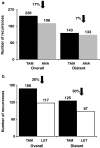Minimizing early relapse and maximizing treatment outcomes in hormone-sensitive postmenopausal breast cancer: efficacy review of AI trials
- PMID: 20830503
- PMCID: PMC2962795
- DOI: 10.1007/s10555-010-9248-x
Minimizing early relapse and maximizing treatment outcomes in hormone-sensitive postmenopausal breast cancer: efficacy review of AI trials
Abstract
Breast cancer is one of the leading causes of cancer-related deaths in women. Regardless of prognosis, all women with breast cancer are at risk for early recurrence. Nearly 50% of early recurrences occur within 5 years of surgery, and they peak at 2 years after surgery in women treated with adjuvant tamoxifen. Most early recurrences are distant metastases, which strongly correlate with increased mortality. Treatments that mitigate the risk of early distant metastases (DM) are, therefore, likely to improve overall survival in women with early breast cancer (EBC). Aromatase inhibitors (AIs)--anastrozole, letrozole, and exemestane-have been investigated as alternatives to tamoxifen for adjuvant treatment of hormone receptor-positive (HR+) EBC in postmenopausal women (PMW). AIs are better at minimizing risk of early relapse compared with tamoxifen. However, it is not clear if preferential use of AIs over tamoxifen will benefit all PMW with HR+ EBC. The ability to subtype HR+ breast cancer on the basis of biomarkers predictive of response to AIs and tamoxifen would likely be key to determining the most beneficial hormonal treatment within patient subpopulations, but this process requires thorough investigation. Until then, adjuvant therapies that provide the greatest reduction in risk of DM should be considered for all PMW with HR+ EBC. This article reviews the clinical trials of AI adjuvant therapies for hormone-sensitive breast cancer, particularly in the context of how they compare with tamoxifen in minimizing the risk of relapse, occurrence of DM, and breast cancer-related deaths.
Figures




Similar articles
-
The breast cancer continuum in hormone-receptor-positive breast cancer in postmenopausal women: evolving management options focusing on aromatase inhibitors.Ann Oncol. 2008 Jan;19(1):16-27. doi: 10.1093/annonc/mdm282. Epub 2007 Aug 9. Ann Oncol. 2008. PMID: 17693420 Review.
-
Choosing early adjuvant therapy for postmenopausal women with hormone-sensitive breast cancer: aromatase inhibitors versus tamoxifen.Eur J Surg Oncol. 2008 Jul;34(7):746-55. doi: 10.1016/j.ejso.2008.01.011. Epub 2008 Mar 4. Eur J Surg Oncol. 2008. PMID: 18296017 Review.
-
Reducing the risk for breast cancer recurrence after completion of tamoxifen treatment in postmenopausal women.Clin Ther. 2007 Aug;29(8):1535-47. doi: 10.1016/j.clinthera.2007.08.013. Clin Ther. 2007. PMID: 17919537 Review.
-
Risk reduction of distant metastasis in hormone-sensitive postmenopausal breast cancer.Breast Cancer. 2009;16(3):207-18. doi: 10.1007/s12282-009-0096-x. Epub 2009 Mar 4. Breast Cancer. 2009. PMID: 19259765 Review.
-
Optimizing aromatase inhibitor integration into initial treatment strategies in postmenopausal women with hormone-receptor-positive early breast cancer.Breast Cancer Res Treat. 2008 Dec;112 Suppl 1:25-34. doi: 10.1007/s10549-008-0237-5. Epub 2008 Dec 20. Breast Cancer Res Treat. 2008. PMID: 19101792
Cited by
-
Preclinical and clinical studies of estrogen deprivation support the PDGF/Abl pathway as a novel therapeutic target for overcoming endocrine resistance in breast cancer.Breast Cancer Res. 2012 May 18;14(3):R78. doi: 10.1186/bcr3191. Breast Cancer Res. 2012. PMID: 22608253 Free PMC article.
-
Immunotherapy of cancer: reprogramming tumor-immune crosstalk.Clin Dev Immunol. 2012;2012:760965. doi: 10.1155/2012/760965. Epub 2012 Oct 11. Clin Dev Immunol. 2012. PMID: 23097673 Free PMC article. Review.
-
Age effect on bone mineral density changes in breast cancer patients receiving anastrozole: results from the ARBI prospective clinical trial.J Cancer Res Clin Oncol. 2012 Sep;138(9):1569-77. doi: 10.1007/s00432-012-1233-z. Epub 2012 May 3. J Cancer Res Clin Oncol. 2012. PMID: 22552718 Free PMC article.
-
Adjuvant Endocrine Therapy in Breast Cancer: A Novel e-Health Approach in Optimizing Treatment for Seniors (OPTIMUM): A Two-Group Controlled Comparison Pilot Study.JMIR Res Protoc. 2016 Nov 7;5(4):e199. doi: 10.2196/resprot.6519. JMIR Res Protoc. 2016. PMID: 27821385 Free PMC article.
-
Abiraterone shows alternate activity in models of endocrine resistant and sensitive disease.Br J Cancer. 2018 Aug;119(3):313-322. doi: 10.1038/s41416-018-0158-y. Epub 2018 Jul 11. Br J Cancer. 2018. PMID: 29991699 Free PMC article.
References
-
- American Cancer Society . Cancer Facts & Figures 2009. Atlanta: American Cancer Society; 2009.
-
- Saphner T, Tormey DC, Gray R. Annual hazard rates of recurrence for breast cancer after primary therapy. Journal of Clinical Oncology. 1996;14(10):2738–2746. - PubMed
-
- Houghton J. Initial adjuvant therapy with anastrozole (A) reduces rates of early breast cancer recurrence and adverse events compared with tamoxifen (T) - data reported on behalf of the ATAC (‘Arimidex’, tamoxifen, alone or in Combination) Trialists’ group. Annals of Oncology. 2006;17(Suppl. 9):94.
-
- Mansell J, Monypenny IJ, Skene AI, Abram P, Carpenter R, Gattuso JM, et al. Patterns and predictors of early recurrence in postmenopausal women with estrogen receptor-positive early breast cancer. Breast Cancer Research and Treatment. 2009;117(1):91–98. doi: 10.1007/s10549-008-0291-z. - DOI - PubMed
-
- Lamerato L, Havstad S, Gandhi S, Jones D, Chlebowski R. Breast cancer recurrence and related mortality in US patients with early breast cancer. Journal of Clinical Oncology. 2005;23(16S):62s.
Publication types
MeSH terms
Substances
LinkOut - more resources
Full Text Sources
Medical

